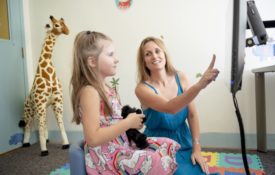-

Four Scholars Pursue Diverse Research Through Cattell Sabbatical Awards
Kenneth Bollen, Jessica Cantlon, Kevin Myers, and Kristin Shutts will extend their sabbatical research in topics ranging from primate cognition to food insecurity.
-
Mandela Effect: What Is It and Why Does It Happen?
The monkey in the popular animated American series Curious George has been a subject of debate worldwide – many believe the monkey has a tail; however, it actually does not. Those who believed the monkey had a tail say they saw him with a dangling tail hanging from trees. Tails are distinctive characteristics of monkeys, so it is understandable why many people would have assumed this particular monkey did as well. This incident is an example of the Mandela Effect and proof that human memory can sometimes be fickle.
-
What World Cup Penalty Shootouts Can Teach You About Performing Well Under Extreme Pressure? A Lot, Considerable Science Says
If you think you're capable of diving deep into rabbit holes, consider psychologist Geir Jordet. He spent five years watching every penalty shootout of every major men's international soccer tournament (of which the World Cup is the most major) from the past fifty years. He also interviewed 25 of the players involved, and then validated his assumptions through practice sessions with 15 different teams. Sound super niche-y? Absolutely, but the goal of his research is universal: to better understand how pressure -- both external and internal -- can affect your performance.
-
How to Save Yourself from ‘Task Paralysis’
Why is it that when you have the most to do you feel the least able to act? This sense of helplessness — also called “overwhelm freeze” — always seems to set in when you have a dozen things on your list, all equally pressing. Or it shows up when you have one huge thing to accomplish that really matters, and you’re stumped on how to even begin. Instead of logically working through your list or slowly chipping away at that behemoth task, your brain acts like it’s a rabbit that’s just sensed a dog in the yard — it stops dead in its tracks.
-

What You Know Changes What and How You See
Can what we know about an object change the way we see it? Dick Dubbelde speaks about how quickly and how well we process different objects.
-

Invitation to Participate in a Multilab Registered Replication Report
Psychological researchers interested in helping with replication efforts in social psychology are invited to join a multilab replication project at James Cook University Singapore. The project will be published in the APS journal Advances in Methods and Practices in Psychological Science.


